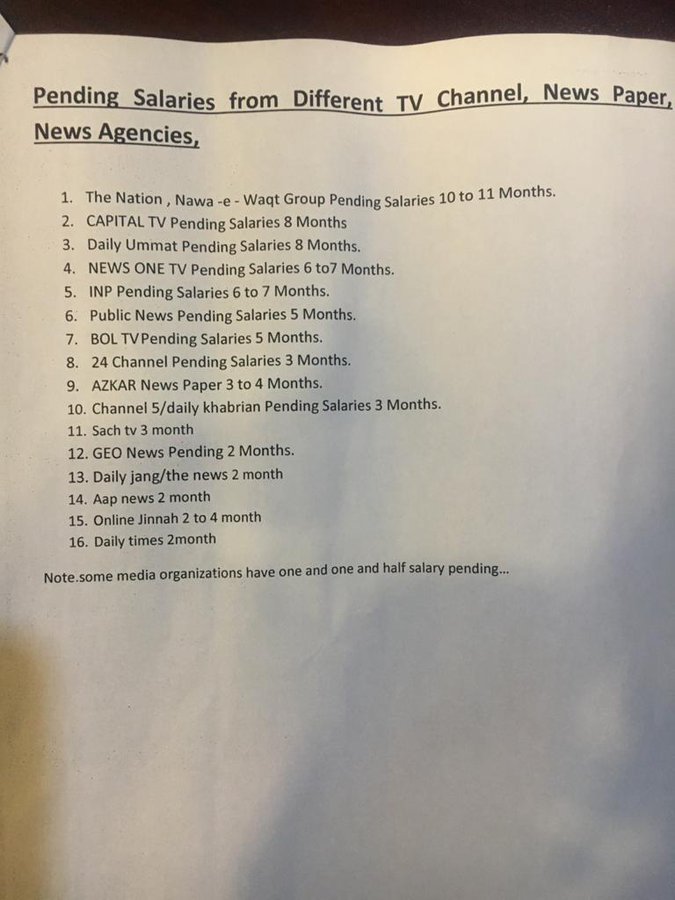Media houses or forced labour camps
Why the media houses are not paying salaries to journalists?
It has
become a norm in Pakistan that media houses delayed the salaries of journalists
and other employees for months. The journalists are forced to work for months
without salaries. The owners of the media houses blame the government for this
situation. While government accuses the media house owners for delay. The
journalists and other staff working in the media houses are suffering in this
blame game.
Even the media
house like Jang/The News/Geo is delaying salaries for couple of months. It
never happened before. The media house
like Nawaiwaqt has not paid the salaries for last 11 months. The media houses
have been converted into forced labour camps.
The
stressful media workers are losing their lives after shown doors and not being
paid for months. They can’t pay school fees of their children- house rents and
utility bills. They worked long hours every day but still borrowed money from
family members and friends to meet the expenses.
Despite the
financial crisis- the owners of the media houses are continue to enjoy their
lavish and luxurious life styles. The top executives continue to receive hefty
salaries. The media houses on the one hand making retrenchments of low paid
jobs but at the same time hiring expensively paid anchors.
The media
houses on the one hand claims that they are facing financial crisis due to the
non-payment of government dues of official ads. Owners
of the media groups have pointed fingers at the new government of Prime
Minister Imran Khan for some of their troubles.
A big share
of the advertisement revenue, by some estimates as much as half for few
channels, comes from the government and its departments. There has been a
substantial decrease in that revenue.
On the other
hand-the government is accusing the media houses for their flawed business
model. PTI government has made cut on the advertisement budget. PTI government reduced the government ads. PTI
government is using the government ads as a tool to change the editorial policy
of different news media groups. The Dawn and Jang/Geo group are facing
government hostility.
So the media
houses are facing the financial crunch. But axe is falling on the lower paid
reporters- sub-editors and cameramen. They are losing jobs and waiting months
for the salaries. The crisis has intensified in last one year as government
showed no sympathy with media industry.
Pakistani
media saw rapid growth from 2002 to 2017. From only one state-run channel two decades
ago, the country's media landscape has completely changed with more than 80 channels
now offering 24/7 news and entertainment shows.
Besides
established media houses such as Jang Group and Dawn which started from a
newspaper business before diversifying into television journalism and
becoming a broadcast behemoth, new entrants also jumped into the fast growing
media industry.
People who
were in the business of selling edible oil and running bakeries have opened up
news channels. They didn’t think about their business model. They wanted media
influence to safeguard other commercial interests. But as news and
entertainment channels flourished, new jobs were created for journalists,
actors, technicians, graphic designers and video editors.
That boom
was one of the positive outcomes of the country's growing economy, as big
corporate houses and multinationals began to spend large sums on newspaper and
television advertisements. Now the country is facing hard times.
Corporate
advertising spend has decreased by 25 percent in the third quarter (July-September)
this year. And there is no indication of it getting any better.
Multinationals
— the biggest advertisers — earn in rupees and repatriate profits to their head
offices in dollars. The disparity in the exchange rate means they are cutting
back on the most dispensable expense — advertisements. The total
advertising spending in Pakistan that includes newspapers, websites and the channels
stands at approximately $670 million.


The evening
talk shows have become a key source of income for media companies. The
primetime shows drive high viewer ratings, an essential indicator to determine
the price-tags for advertisements.
The race to
land the best host has bloated salaries of anchors to as much as $37,000 a
month. That’s manifold compared to $350 a month that many reporters and cameraman
make.
It is worth
noting that the International Federation of Journalists (IFJ) and its affiliate
the Pakistan Federal Union of Journalists (PFUJ) have strongly condemned the
‘wage theft’ epidemic led by media companies and calls on Pakistan’s government
to review the industry and ensure all outstanding salaries are paid
immediately.
Analysts
believe that “the practice of delaying salary payments has become increasingly
common in Pakistan with some of the worst offending media companies delaying
payments by as much as ten months, despite journalists continuing to work and
provide professional services. The term “death by stress” is now well-known”.
Moreover,
The IFJ and PFUJ have documented more and more cases of the extreme
repercussions of non-payment of wages on media workers in the country in the
past year.
Khalid Bhatti













Post a Comment